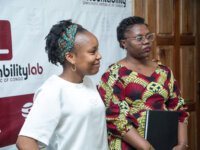In the VUCA (volatility, uncertainty, complexity and ambiguity) world, the tasks of the government are interconnected and require cross-border collaboration and dialogue within ecosystems. However, one of the key challenges is the lack of knowledge and easy-to-deploy tools. As partners of Work2.0Lab (Työ2.0Lab), we co-created and implemented Ecosystem School 1.0. Its purpose was to develop ecosystem thinking, capabilities and tools to support phenomenon-oriented work within ecosystems.
Innovation Tag: Leadership
The Accountability Incubator is a creative peer learning program for young civic activists and change-makers who want to fight corruption and build accountability. It was developed to provide long-term support, networks and skills to people who are often overlooked by or left out of traditional civil society programs. It is innovative in that it uses creative tools, a long-term approach and the very latest thinking to shape governance globally.
Customer-oriented public services direct the authorities to look at citizens from their own responsibilities without taking into account a citizen’s overall life situation. A human-centric and life event -based operating model supported with the life-event service ecosystem technology enables the authorities to produce value directly in people's life events through the cooperation of other service providers in a timely and proactive manner.
The Future Mentors programme is a reversed mentoring programme in which a small group of young people mentor a decision maker from their own city about the hopes, dreams, and fears of the young generation regarding the future of their city. The programme is a platform for youth in cities to get into a dialogue with the decision makers and get their concerns and wishes heard. Twenty-six cities around Europe participated in the programme in 2022.
We can agree on a lot more than we are led to believe. PolicyKeys is firstly a robust one-page narrative tool built around a ground truth so an AI can assist in predicting support for any public policy solution. PolicyKeys is secondarily a role-playing game to help player's better understand their own internal conflicts, as well as better understand their fellow citizen's differing beliefs—the result is a leaderboard of ideas that have deep and wide acceptance—approaching consensus.
An Economic Reform Governance Model to reform design and delivery of citizen-and business-centric public services was introduced in 2016. Aim of the Model was to eliminate barriers, ensure transparency, develop digital public services and expand competitiveness through increasing engagement of civil society and businesses in the reform process. Implementing 136 reform initiatives by passing 55 legal acts enabled the government to create more favorable social-economic opportunities for citizens.
This is an account of how managers became enthused and took responsibility for leading change and co-creating it with their staff within the Planning service. The approach they took was in stark contrast with their standard and legislative based thinking and obvious digital solutions. They incorporated new management behaviours and team working. Waste was dramatically cut, and the staff environment created a highly motivating culture. The impact of the customers needs was profound.
Innovacion Publica (IP) 360 seeks to respond to the low levels of trust in government and to the unequal distribution of innovation in Latin America's public sector. The project has a holistic approach to reach local governments that are not part of the mainstream opengov networks. It delivers actions in 19 local governments to strengthen citizen participation, transparency and digitalization. The lessons learned are then scaled up through a regional learning community of public innovators.
The Global Councils on SDGs is a unique interdisciplinary network of decision makers from governments, international organizations, academia, and the private sector, who came together to share innovative practices and discuss the creative implementation of the SDGs at the national and global level. Based at the World Government Summit, the Councils aimed to work on creating new partnerships between countries, organizations, and sustainable development advocates for the implementation of SDGs.
The GCF is the MMC’s response to the unmet needs of cities as they work to support migrants, refugees, & IDPs during COVID-19. By offering direct financial and technical support to cities in low & middle income countries, the GCF proves fiscal feasibility in places that are often disregarded by donors with low-risk tolerance. The vision is to create a model that can be scaled & replicated elsewhere to ensure that global responses to pressing challenges reflect & address realities on the…








